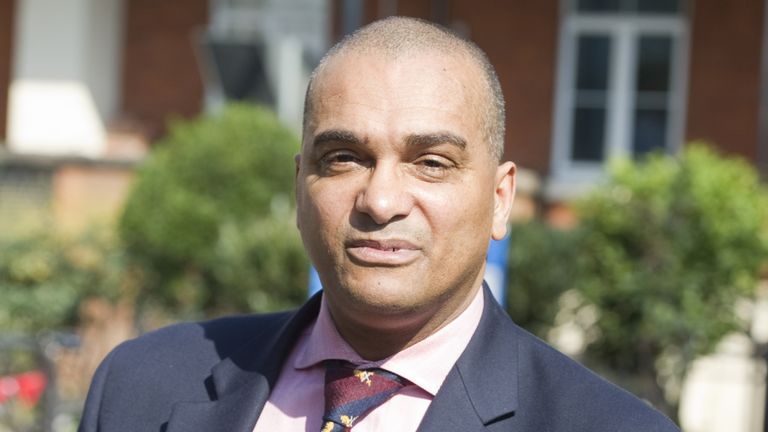New study commissioned by FA and PFA reveals link between football and dementia
FA chairman Greg Clarke: "The global football family now unites to find the answers and provide a greater understanding of this complex issue"
Monday 21 October 2019 17:32, UK
Former footballers are approximately three and a half times more likely to die from neurodegenerative disease than the general population, according to a new study.
The new report, commissioned by the Football Association and the Professional Footballers' Association, assessed the medical records of 7,676 men who played professional football in Scotland and were born between 1900 and 1976.
Their records were matched against more than 23,000 individuals from the general population, with the study led by consultant neuropathologist Dr Willie Stewart of Glasgow University.
His findings report that the "risk ranged from a five-fold increase in Alzheimer's disease, through an approximately four-fold increase in motor neurone disease, to a two-fold Parkinson's disease in former professional footballers compared to population controls".
Although footballers had higher risk of death from neurodegenerative disease, they were less likely to die of other common diseases, such as heart disease and some cancers, including lung cancer.
The study - titled 'Football's Influence on Lifelong Health and Dementia Risk' or FIELD for short - found that deaths in ex-footballers were lower than expected up to age 70, and higher than expected over that age.
The FA's statment said: "This is one of the most comprehensive studies ever commissioned globally into the long-term health of former professional footballers.
"As you would expect, there are many questions relating to this data that do not, at present, have answers.
"The study does not determine whether the cause is due to concussions suffered by the group of professional footballers, or concussion management, or heading of the football, or style of play, or the design and composition of footballs over the years, or personal lifestyle, or some other factor.
"It recommended that we re-issue both the current FA Concussion Guidelines and best-practice advice for coaching heading, while also asking football to consider further steps to improve head injury management, for example by supporting UEFA's proposals to introduce concussion substitutes.
"The Medical & Football Advisory Group also concluded that more research is needed into why players had been affected, but that there is not enough evidence at this stage to make other changes to the way the modern-day game is played.
"We've written to both FIFA and UEFA to offer our full support on future research in this area, as well as share the findings of the FIELD study with them.
"Dementia is a terrible illness and we're committed to doing everything possible to better understand the issues and get the answers needed."
Dr Stewart added: "An important aspect of this work has been the ability to look across a range of health outcomes in former professional footballers.
"This allows us to build a more complete picture of health in this population."
"Our data shows that while former footballers had higher dementia rates, they had lower rates of death due to other major diseases.
"As such, whilst every effort must be made to identify the factors contributing to the increased risk of neurodegenerative disease to allow this risk to be reduced, there are also wider potential health benefits of playing football to be considered."
FA chairman Greg Clarke said: "The whole game must recognise that this is only the start of our understanding and there are many questions that still need to be answered.
"It is important that the global football family now unites to find the answers and provide a greater understanding of this complex issue. The FA is committed to doing all it can to make that happen."
PFA chief executive Gordon Taylor stated that it was "incumbent on football globally to come together to address this issue in a comprehensive and united manner".
"Research must continue to answer more specific questions about what needs to be done to identify and reduce risk factors," he added.
An EFL spokesman said: "The EFL notes the results, and has made its clubs aware, of a study into professional footballers and degenerative neurocognitive disease conducted by the University of Glasgow, on behalf of the FA and PFA.
"We will study the results closely and contribute fully to further consideration of this important matter.
"The FA's independently led Medical & Football Advisory Group has concluded that there is not enough evidence at this point to change the way the modern game is played but that further research is needed.
"The EFL will play its part in this work through its role on that group as it is imperative that we better understand if there are any implications for our sport."
Brain injury charity Headway has called for more research be undertaken, but this time focusing on modern lightweight footballs.
"For many years, families and campaigning charities such as Headway have been demanding research into the long-term effects of repeatedly heading footballs," said Peter McCabe, chief executive of Headway.
"We welcome the work done by Dr Stewart and his team, but this study was always going to leave a lot of questions unanswered.
"We have known for some time that there is a link between the cumulative effect of repeated blows to the head - such as those suffered by boxers - and degenerative neurological conditions such as dementia.
"The fact that this long-awaited study has now identified a link in former footballers will no doubt lead to questions about how this will impact the modern game.
"It is vital that this research is now built upon, with a particular focus on the relative risks of heading lightweight modern footballs."







